What RV internet options are best for digital nomads and working full-time RVers?
Redundancy: The Best Mobile Broadband Solution
I have said it at least once before. Redundancy is the best internet for RVers, at least for those of us who enjoy working from anywhere and must stay connected all of the time, everywhere we go. And while I have written various posts and reviews of RV internet options, it dawned on me that we have no single round-up of the myriad methods we use – or have used – to get online in our travels over the past ten years.

Mobile RV Internet Options: Pros and Cons for RVers
Here are brief descriptions, with the primary pros and cons of each mobile broadband solution we have in our RV Internet arsenal. Follow the links for more detailed specifications and more product reviews where applicable.
USAGE NOTES: We are not your typical full-time RVers, if there is such a thing. We are not retired. Our online work requires us to be able get online anytime, every day, no matter where we are. I maintain client websites and manage a server hosting more than 1,800 Tripawds Blogs. As a designer, I frequently send and receive large data files. Our preferred travel plans often take us way off the grid. We prefer to live and work from some very remote locations, often without cellular service. We do not subscribe to Netflix or waste much of our time streaming movies or television programs, though we do enjoy streaming Amazon Prime Music and periodically watching Amazon Prime Video programs.
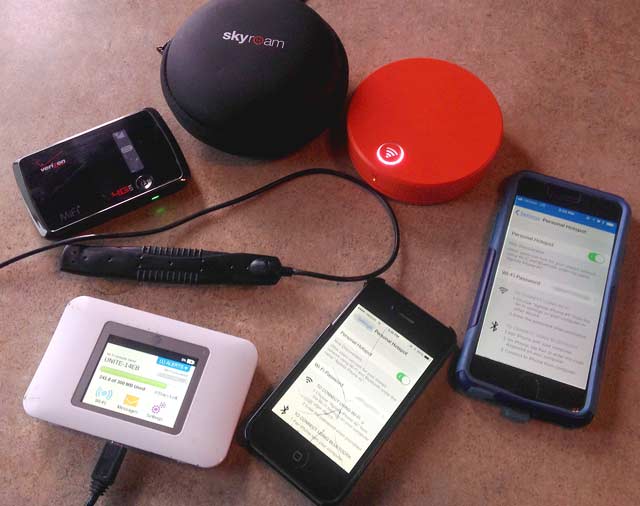
Cellular Data Devices
Cell phones and mobile hotspots are the most popular RV internet options. Whenever within range of cellular networks, we mainly rely upon our Verizon devices with unlimited data plans. NOTE: We do not use any cell phone signal booster since we rely upon our satellite internet service whenever cellular coverage is lacking. When camped on the fringe of cellular reach, we do use an external Mifi antenna.
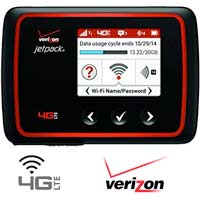
Verizon Mifi – Verizon Wireless 4G
We originally purchased our Novatel Mifi 4510L quite a few years ago now. It serves us well but is showing its age and we are now considering upgrading to the Verizon JetPack. Both of these compact mobile broadband hotspots offer fast 4G wireless connectivity within the Verizon network coverage area. Includes adequate router administration interface.
PROS: Compact, convenient and fast. Easily connect multiple devices via this compact hotspot with 4G service on the #1 ranking cellular service provider and largest coverage area.
CONS: Limited to Verizon cellular coverage areas and requires annual service contract. Battery power is limited (on 4510L). Bandwidth throttled to 3G after 10GB of usage. Speeds are dependent upon the local network capacity.
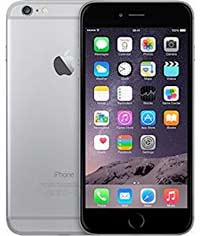
iPhone 6 – Verizon Wireless 4G
The personal hotspot feature of our iPhone 6 provides additional mobile broadband service.
PROS: Convenient and fast. Connect multiple devices with 4G service on the #1 ranking cellular service provider and largest coverage area. Unlimited data.
CONS: Limited to Verizon cellular coverage areas and requires annual service contract. Bandwidth throttled to 3G after 10GB of usage. Speeds are dependent upon the local network capacity. iPhone tends to get hot and battery bower is impacted when using hotspot function.
iPhone 4s – Verizon Wireless 3G
We only use our old iPhone 4s as a backup, and primarily use the hotspot function to stream Amazon Music or Pandora radio.
PROS: Convenient. Inexpensive as part of our multi-device Verizon service plan. Unlimited data.
CONS: Limited to Verizon cellular coverage area. Only provides 3G data service.
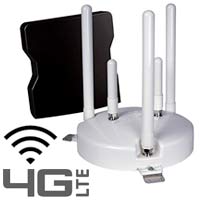
Winegard ConnecT – AT&T 4G
We tested and reviewd the Winegard ConnecT +4g LTE and found it to be an excellent internet solution for RVers who rely on local WiFi and want a mobile wireless data connection with no service contract.
PROS: No monthly service contract contract required. Purchase “pay as you go” data packages and use data as you need it. Easy installation and intuitive management interface. Multipurpose – public wifi extender with 4G LTE broadband service.
CONS: Limited to AT&T cellular coverage areas. Data packages expire in 30 days. Requires mounting to RV roof for permanent use. Initial hardware investment $600+.
» Read all Winegard ConnecT reviews.
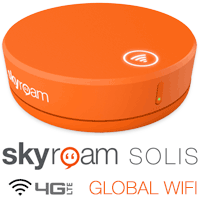
Skyroam Solis – 4G (Various Service Providers)
The Skyroam Solis is designed with the international traveler in mind. This global Wifi hotspot provides mobile internet access anywhere with no service contract, in 100+ countries around the world. Long lasting battery also charges mobile devices. This makes it one of the best RV internet options for those traveling globally.
PROS: Does not rely on any single service provider, connects via strongest local network. No monthly service contract contract required. Purchase “daypasses” as you need them for 24 hours of connectivity. Unlimited data available with each daypass. 20% Skyroam coupon code available.
CONS: No router administration interface (feature coming soon). Daily bandwidth throttled after 500MB of usage, but resets with next daypass purchased.
» Skyroam Solis Hotspot Review and Coupon Code
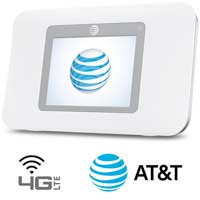
AT&T Unite – AT&T 4G
We purchased an AT&T Unite mobile wifi hotspot when troubleshooting Verizon network packet loss issues. While it did provide an alternate internet access method, we did not renew our AT&T service contract since our travels rarely take us to regions where AT&T coverage is better than Verizon. We intend to keep the device as a backup, and may renew service if/when that time comes.
PROS: More affordable than comparable Jetpack hotspots. Touchscreen display provides helpful information without logging in to admin interface.
CONS: Limited to AT&T cellular coverage areas. Known bug (at time of purchase) prohibiting secure access to servers via ssh.
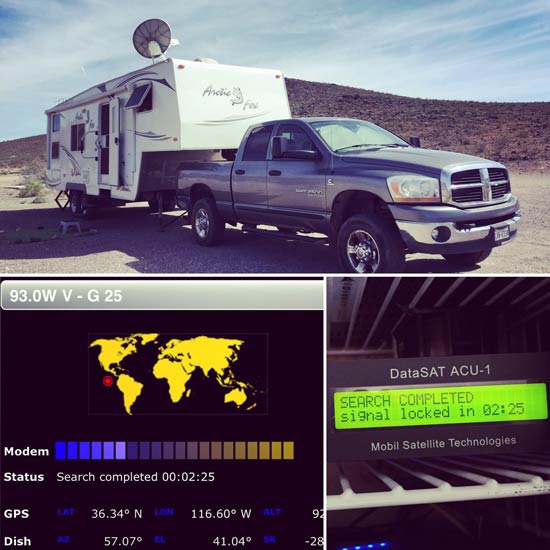
Satellite Internet Service
RV DataSat 840 – iDirect
We get online anywhere with our RVDataSat 840 satellite internet system with iDirect service from MobilSat. The RVDataSat from Mobilsat is the only auto-deployed satellite Internet system designed especially for consumers, produced by the leaders in mobile satellite internet and TV technologies. Satellite internet may be one of the most expensive RV internet options, but it’s the only one that will get you online virtually anywhere!
PROS: Provides quick access to broadband internet service anywhere with an open view of the southern sky. Works where cellular devices don’t. Cisco 2-port Phone Adapter and optional Voice over Internet service provide VoIP telephone connectivity in areas without cellular service.
CONS: Initial hardware investment: $6000+. Requires certain amount of technical ability and troubleshooting skills should connectivity problems arise.
DataStorm – HughesNet
We installed the DataStorm satellite internet system by MotoSat when we originally purchased our first RV in 2007. MotoSat is no longer in business, though used systems may be available.
PROS: Get online anywhere via satellite internet, even in areas without cellular service.
CONS: HughesNet satellite internet service is slow compared to iDirect. Older systems may be prone to hardware failure.
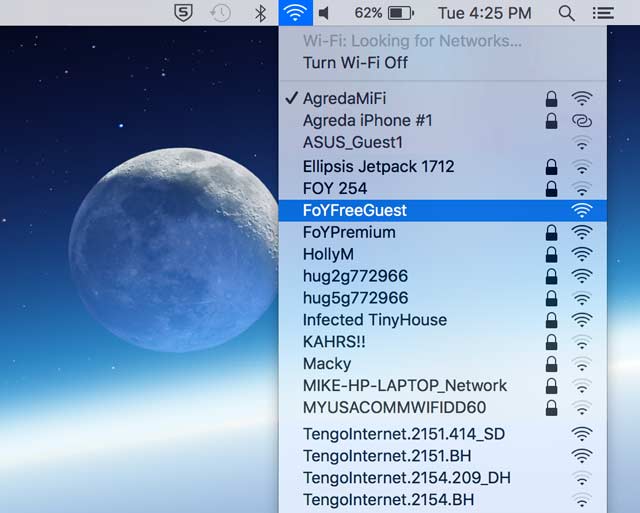
Local Public Wifi
RV Park Wifi
If we ever find ourselves at an RV park with acceptable wifi service, we consider ourselves lucky! Most RV parks networks are not suitable for the number of users and type of usage.
PROS: Cost is usually free!
CONS: Speeds are often slow and reliability is lacking. Open networks are less secure.

Winegard ConnecT – Wifi Extender
The Winegard ConnecT will extend the reach of any local wifi network, enabling RVers to camp further away from the the office (or network antenna) with improved performance.
PROS: No monthly service contract contract required. Multipurpose – public wifi extender with 4G LTE broadband service available. Wingard makes a less expensive version of the ConnecT wifi extender without 4G.
CONS: Limited to AT&T cellular coverage areas. Data packages expire in 30 days. Requires mounting to RV roof for permanent use. Initial hardware investment $600+.
What RV Internet options do you use to get online?
And how? This is by no means intended to be a summary of all the mobile broadband connectivity options available to full-time RVers. These are only the solutions that meet our specific business and personal connectivity requirements. The best one for you will be determined by your own usage needs.
Thanks for the awesome post! Was checking out RVDataSat and saw the offer an unlimited cellular internet plan: http://www.rvdatasat.com/cell/
Have you looked into this at all? Curious if it would be a better alternative to Verizon/AT&T.
Thanks again!
Hey there. Yes! We’ve been meaning to write about the new Mobilsat offering. It is an awesome alternative and we will probably be signing up for it as soon as we start rolling again.
Thank you for all the suggestions. What combination of systems/providers would your recommend for someone who spends most of their days in remote locations using video based platforms like Zoom or Skype?
That would depend upon just how remote…cellular broadband is going to be your best choice for any streaming services. The weBoost signal booster will help with that. Without any cell service, you’ll need satellite internet, and I’d recommend the RVDataSat an suggest checking out the premium data plans from MobilSat for the best streaming experience. Tell them LiveWorkDream sent you!
Thanks for reading!
We use RV-4G.com as our provider, a good low-cost service! We travel all over the US and the only place we’ve had problems is in Wyoming but even our Verizon cell phones didn’t work there. We only pay $60 a month for completely unlimited internet, it’s a great deal!
Thank you for this. I’ve been so confused about how to proceed as I would like to boondock and need internet for work as well. I’m thinking I’ll make the leap to Verizon from my current At&T plan as it seems like it does offer the most coverage.
Patty Blue Hayes
Thanks for reading Patty, glad you found this helpful. We have found that Verizon does provide much better coverage, especially throughout the west. But redundancy is a must, if you must have access anywhere, anytime.
We try to keep it simple. We have an AT&T hotspot that we use for work. It’s an unlimited data plan and we’ve never experienced throttling, so Ryan can also feed his streaming video habit as much as he needs.
Our phones are Verizon with a small data plan. We use this as a backup for working if/when we go to a place where AT&T service is poor.
That’s all we’ve got so far.
Hey great to hear from you! Thanks for the feedback, glad that’s working for you – more proof that redundancy is key. 🙂
Jim, I understand that King is coming out with a new automatic directional wifi extender that is supposed to be much better than Winegard’s Connect T. Any info from you side?
Nope, but that’s good to know! Thanks.